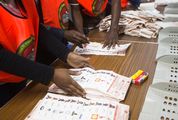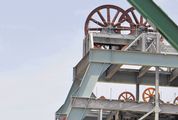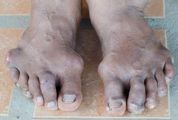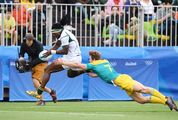TRAIN 2217 from Soweto, headed to former president Nelson Mandela’s memorial service at the FNB Stadium, arrives at iKhwezi station in Mofolo just before 7.30am on an overcast Tuesday morning.
Among the 100 or so passengers who hurriedly jumped onto the free train is Sipho Mpesi, a former member of the African National Congress (ANC) military wing, uMkhonto weSizwe (MK). The 53-year-old, clad in full MK camouflage uniform, lives in Snake Park in Dobsonville, Soweto.
Mandela was the first MK commander-in-chief when it was formed in 1961. Mr Mpesi says he left South Africa for Zambia in 1985, where he was on a mission to be trained as an MK combatant. He was recruited by his uncle, Teddy Mpesi, who was by then active in the United Democratic Front, a body that incorporated many anti-apartheid organisations.
"My uncle influenced my politics," he says. "He told me the whites took our land. I realised then that these people were oppressing us." Mr Mpesi says his role in the ANC’s underground activities included distributing the party’s insurgence campaign pamphlets at night.
The ANC had headquarters in Lusaka. It was from Lusaka that the ANC operated and co-ordinated the activities of MK in various parts of Southern Africa, according to the South African History Online. "MK established a network of underground houses across various suburbs in Lusaka where recruits were relayed to other countries for military training".
Mr Mpesi says he was on camp when Mandela was released from prison in 1990. He says they were not aware of the developments in South Africa, and learnt of Mandela’s release and the unbanning of the ANC from their commanders and later through the media. "We were still prepared to fight with the Boers. We had still intended to drive them out by the gun," he says.
Back on the train, less than 10km from iKhwezi, at the New Canada train station, Mr Mpesi assists people going to the memorial service, some of whom appear confused about which train to take. Those going to Johannesburg have to switch trains, as 2217 deviates at New Canada to Nasrec station, near the FNB stadium.
During the trip, Mr Mpesi criss-crosses the train searching for coaches where people are singing and chanting. A group of about 20 young people follows behind. Among the chants is one that "the ANC will rule until Jesus comes". The controversial struggle song Dubhul iBhunu also features among the big hits with the crowd.
About 15km later, train 2217 arrives at Nasrec station at FNB stadium shortly before 8.40am. Mr Mpesi quickly disappears in the singing crowd of hundreds disembarking from several trains transporting mourners from different parts of Gauteng.
By 10am the FNB stadium is slowly filling up, the top tier on the west end of the stadium jam packed. The crowd sings and dances in the drizzle, on occasion lifting hands in a form of Mexican wave.
A group of former ANC youth league president Julius Malema’s Economic Freedom Fighters is booed by the crowd when they appear on the two big screens on the east and west ends of the stadium.
ANC chairwoman Baleka Mbete and party deputy president Cyril Ramaphosa are to conduct the proceedings of the service.
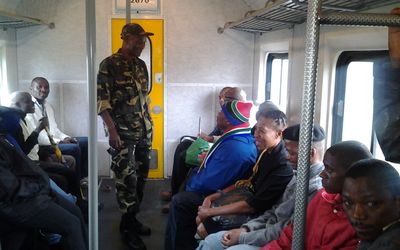
Sipho Mpesi, a former member of the ANC's military wing Umkhonto we Sizwe, speak to people on a train to the FNB Stadium in Johannesburg on Tuesday, ahead of the national memorial service for Nelson Mandela. Picture: SETUMO STONE
TRAIN 2217 from Soweto, headed to former president Nelson Mandela’s memorial service at the FNB Stadium, arrives at iKhwezi station in Mofolo just before 7.30am on an overcast Tuesday morning.
Among the 100 or so passengers who hurriedly jumped onto the free train is Sipho Mpesi, a former member of the African National Congress (ANC) military wing, uMkhonto weSizwe (MK). The 53-year-old, clad in full MK camouflage uniform, lives in Snake Park in Dobsonville, Soweto.
Mandela was the first MK commander-in-chief when it was formed in 1961. Mr Mpesi says he left South Africa for Zambia in 1985, where he was on a mission to be trained as an MK combatant. He was recruited by his uncle, Teddy Mpesi, who was by then active in the United Democratic Front, a body that incorporated many anti-apartheid organisations.
"My uncle influenced my politics," he says. "He told me the whites took our land. I realised then that these people were oppressing us." Mr Mpesi says his role in the ANC’s underground activities included distributing the party’s insurgence campaign pamphlets at night.
The ANC had headquarters in Lusaka. It was from Lusaka that the ANC operated and co-ordinated the activities of MK in various parts of Southern Africa, according to the South African History Online. "MK established a network of underground houses across various suburbs in Lusaka where recruits were relayed to other countries for military training".
Mr Mpesi says he was on camp when Mandela was released from prison in 1990. He says they were not aware of the developments in South Africa, and learnt of Mandela’s release and the unbanning of the ANC from their commanders and later through the media. "We were still prepared to fight with the Boers. We had still intended to drive them out by the gun," he says.
Back on the train, less than 10km from iKhwezi, at the New Canada train station, Mr Mpesi assists people going to the memorial service, some of whom appear confused about which train to take. Those going to Johannesburg have to switch trains, as 2217 deviates at New Canada to Nasrec station, near the FNB stadium.
During the trip, Mr Mpesi criss-crosses the train searching for coaches where people are singing and chanting. A group of about 20 young people follows behind. Among the chants is one that "the ANC will rule until Jesus comes". The controversial struggle song Dubhul iBhunu also features among the big hits with the crowd.
About 15km later, train 2217 arrives at Nasrec station at FNB stadium shortly before 8.40am. Mr Mpesi quickly disappears in the singing crowd of hundreds disembarking from several trains transporting mourners from different parts of Gauteng.
By 10am the FNB stadium is slowly filling up, the top tier on the west end of the stadium jam packed. The crowd sings and dances in the drizzle, on occasion lifting hands in a form of Mexican wave.
A group of former ANC youth league president Julius Malema’s Economic Freedom Fighters is booed by the crowd when they appear on the two big screens on the east and west ends of the stadium.
ANC chairwoman Baleka Mbete and party deputy president Cyril Ramaphosa are to conduct the proceedings of the service.



